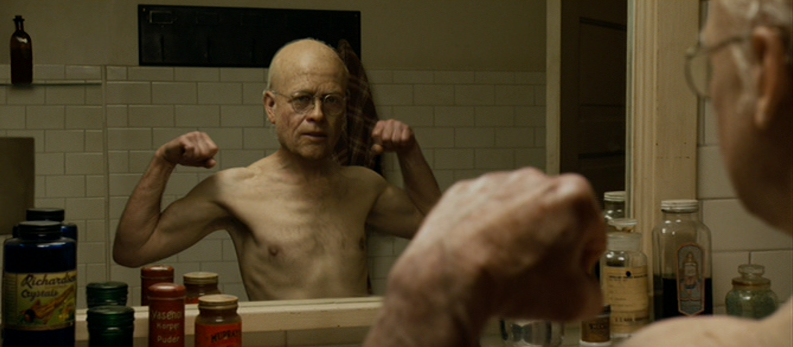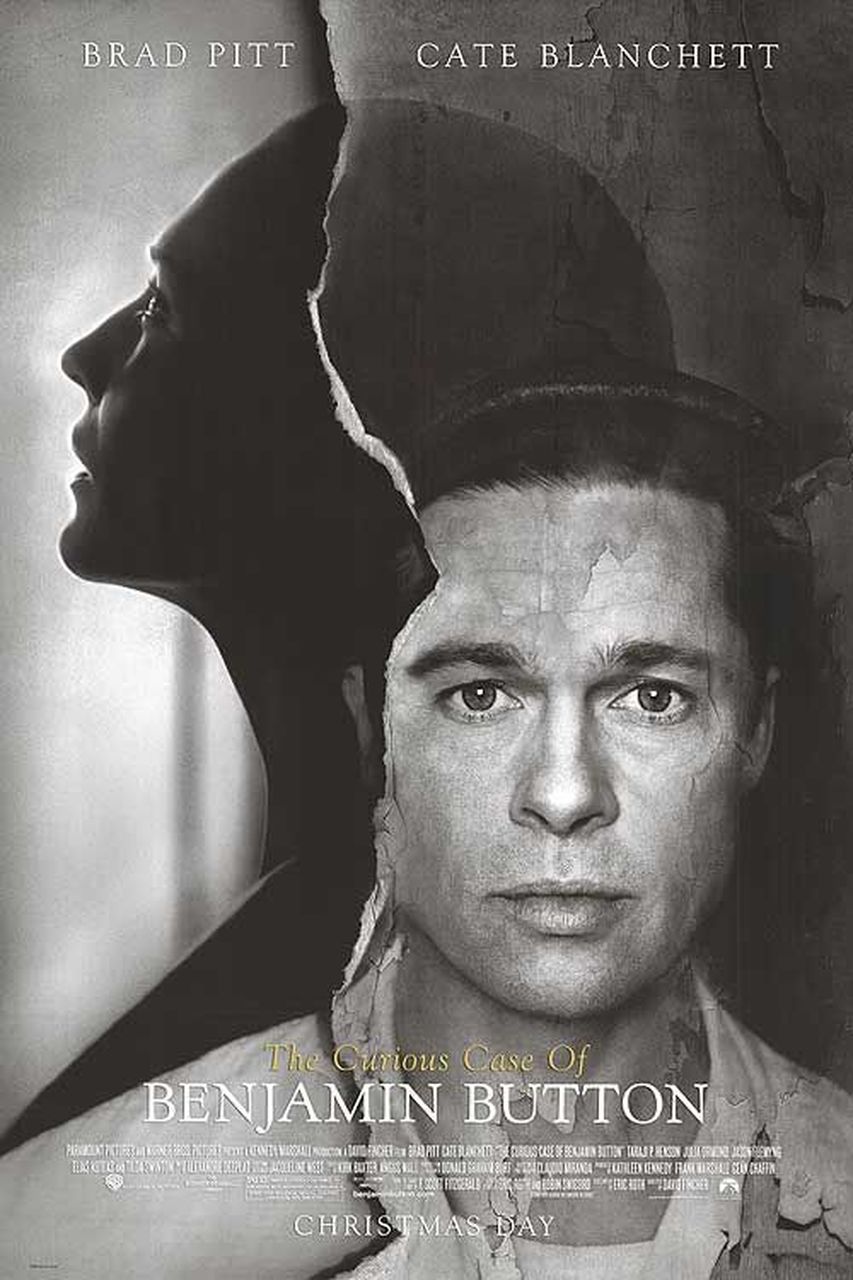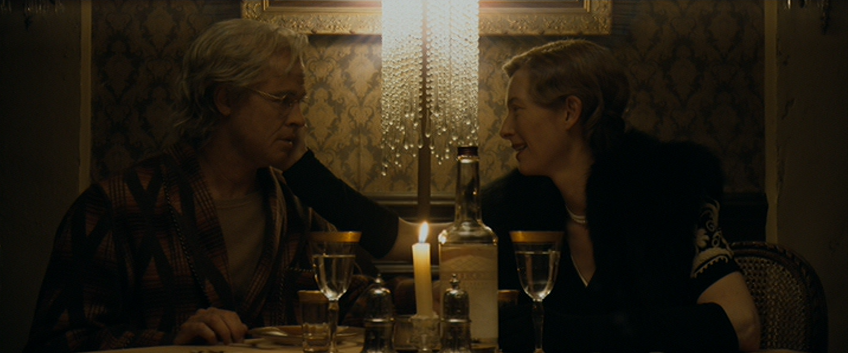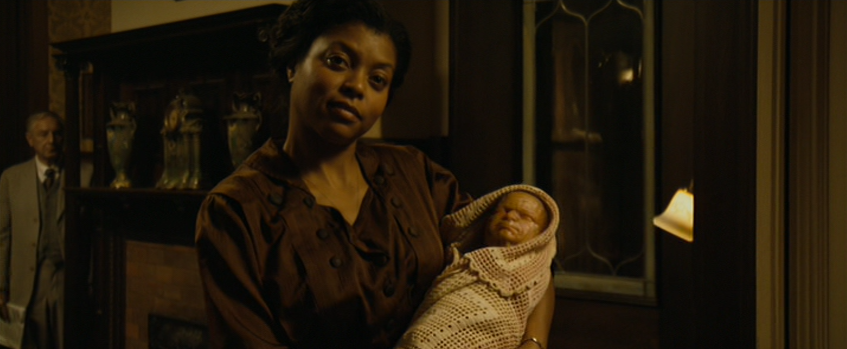

“Our lives are defined by opportunities; even the ones we miss.”
The Curious Case of Benjamin Button is a magnificently made film—gorgeous cinematography, great acting, colorfully characters, a time-hopping narrative, comedic interludes, great make-up, superb period detail. It’s got a bit of everything and it does all of it well, in large part due to the impeccable direction of David Fincher, who seems incapable of making a real dud. The film is undeniably a good one, but after the sentimental high that it invokes fades away, it becomes clear that there is something off about its underlying premise that dampens the impact of its emotional narrative. That’s not to say it’s bad (I just said it was good!) but that it doesn’t sit quite as well as other films of its ilk. It’s clearly trying to fit itself into the same life-affirming, hug-your-loved-ones-tight niche as Good Will Hunting and Forrest Gump,1 but it’s unnatural setup simply doesn’t allow that.
Taking the protagonist from F. Scott Fitzgerald’s short story of the same name, our main character is the reality-defying oddity known as Benjamin Button (Brad Pitt2). Benjamin is born on the night that World War I ends. His mother dies in childbirth, and his father, Thomas Button (Jason Flemying) decides to rid himself of the wrinkly infant he finds in the crib. The baby is found by Queenie (Taraji P. Henson), a caretaker at an old folks’ home. Since she herself is incapable of having children, she works up a story about her sister’s boy “coming out white” so that she can take care of him for what she is told will only be a short time. He fits right in with the other residents at the home who are approaching their deaths. But as Benjamin gets older, he gets… younger! Soon he is out of his wheelchair and using crutches and his hair is coming back in. His arthritis starts to go away and he begins to experience sexual urges.
That begins the “chronological” narrative of Benjamin Button. Separate from that story is an intermittent dialogue between Caroline (Julia Ormond) and her dying mother Daisy (Cate Blanchett), set in a New Orleans hospital while Hurricane Katrina rapidly approaches. The mother tells us of a blind clockmaker, commissioned to build a magnificent clock for a new train station in 1918. When the clock is revealed, at a large ceremony with Teddy Roosevelt in attendance, it begins running backwards. It’s a memorial, says the clockmaker, for the young men killed on the field of battle, that they may return to their homes and lives and futures. The clockmaker was never seen again. Daisy then asks Caroline to read to her from a diary—the diary of Benjamin Button.

Very soon, the old-in-body-young-in-spirit Benjamin meets seven year old Daisy (Elle Fanning) and falls in love. The rest of the film is largely about their unconventional romance, as Benjamin grows younger, begins working on a tugboat, and joins the American ranks during WWII, all the while sending Daisy postcards from wherever he happens to be. Daisy is briefly portrayed by Madisen Beaty before Cate Blanchett takes over and Daisy heads to New York City to join a dance company. Benjamin and Daisy both take other lovers (old man Benjamin humorously loses his virginity when Captain Mike (Jared Harris) takes him to a brothel) but eventually wind up together back in New Orleans around the time their physical ages coincide. It is around this time that Caroline, in the present, discovers that Benjamin is her father. “This is how you tell me?” she sneers at her dying mother.
Benjamin ditches his new family, telling Daisy that she can’t handle raising Caroline and his devolution into childhood simultaneously. But when he is found as a deranged five year old with Daisy’s name written throughout his diary, the sixty-something Daisy ends up caring for him as he forgets who she is, forgets how to talk, loses the ability to walk, and finally closes his eyes for the last time. It’s all very sappy and makes you want to go tell people you love that you love them, which I believe was the intention.

My issue with the film is that the central gimmick doesn’t lend itself to an epic romance, and the gimmick is given preference over the character. By the end of the film, we know very little about Benjamin Button other than that he ages backwards and has decided to accept whatever else life throws his way. Take for instance, the episode in which he finds himself unable to sleep, and befriends Elizabeth Abbott (Tilda Swinton) in the hotel lobby. They meet every night for tea, and eventually have an affair. But their conversations are masked by montage, music, and voiceover. We learn about Elizabeth’s abandoned ambitions but nothing about Benjamin. But what could he have said? He wouldn’t have told her about his condition, most likely. Otherwise, it’s just two adulterers getting handsy on the sly, and what’s unique about that? It’s there to make his reconciliation with Daisy more meaningful, to add heft to the present-day conversation between Daisy and Caroline, but since Benjamin is a contrivance instead of a character it has to be implied rather than actual.

Later, when Daisy gives up her headstrong ways and returns to the old folks’ home, we understand why she would find comfort in the arms of the loyal Benjamin. But we can’t know why Benjamin still desires Daisy after all this time because we don’t know why he fell in love with a seven year old girl in the first place. If the filmmakers had decided to lean into the weirder aspects of the character instead of going for full blown sentimentality, this could have been an interesting part of the film. Where before we were presented with an old man infatuated with a prepubescent girl, now we have a middle-aged man and a hot-blooded woman. But soon, we will have a greying Daisy and a toddler. Is it right for these people to make love, to make a child? It’s not a surprise that Hollywood treats sex as something automatically deserved; something that takes place in a moment, an act without permanence. This moment of joining is meant to be an emotional high point in the film but how can you watch that and feel like it is right? We’re dealing with fantasy, of course, but if you’ve accepted the gimmick then at least have the honesty to call out how stupid and gross it is for these people to be copulating. The only sense in which this is fitting is if you wish to fit the square peg of Benjamin Button into the round hole of cinematic convention. But this is a weird tale, not the poignant one that the creative team want it to be. In reality, Benny Button would be an attraction at a freakshow, not the central character of a fairytale.

I’d argue that the acting saves this film from devolving into an expensive, well-made mess. Pitt, in particular, does a great job of creating slightly different personas as his character changes. But too often it seems like the filmmakers relied on emotional music and vague adages to try to mask the lack of a truly affecting story. It’s simply impossible to relate to a backward-aging character, and so we can’t go deeper than the surface. The closest thing is someone’s mind deteriorating in old age, but that’s different from watching your spouse’s body grow lean and strong while your’s grows soft and frail. There are certainly touching moments, but these are mostly unrelated to the film’s central character. I suppose, to nutshell it, it seems like the film is a big budget romance with magical realist elements tacked on to try to appeal to certain crowds and garner accolades. As an epic romance, it’s fine, probably better than most, but it’s newfangled main character doesn’t do anything other than draw curious eyes. See it for its technical achievement, excellent cast and make-up team, and a few truly great moments of cinema; but it’s not a modern classic, it’s not Fincher’s best, and it’s not profound.
1. Screenwriter Eric Roth penned both Gump and Benjamin Button.
2. A number of other actors were used as well to show Benjamin at different stages of his life, but the variably aged or de-aged face of Brad Pitt is featured throughout the film through extensive motion capture, CGI, and makeup.
Your style is so unique in comparison to other folks I’ve read stuff from.
Thank you for posting when you have the opportunity.
Yes please. I sit right here licking my wounds.
Heya! I’m at work surfing around your blog from my new iphone!
Just wanted to say I love reading through your blog
and look forward to all your posts! Carry on the fantastic
work!
I love your blog.. very nice colors & theme.
Did you create this website yourself or did you hire someone to do it for you?
Plz reply as I’m looking to design my own blog and would like
to find out where u got this from. thanks a lot
I think that you could do with a few more pics to drive the message home a bit, but other than that,
this is fantastic blog. A fantastic read. I’ll definitely be back.
Does your blog have a contact page? I’m having a tough time locating it but, I’d like to send you an email.
Either way, great site and I look forward to seeing it improve over time.
Is this a paid theme or did you customize it yourself? Either way keep up the nice quality writing, it’s rare to see a great blog like this one today.